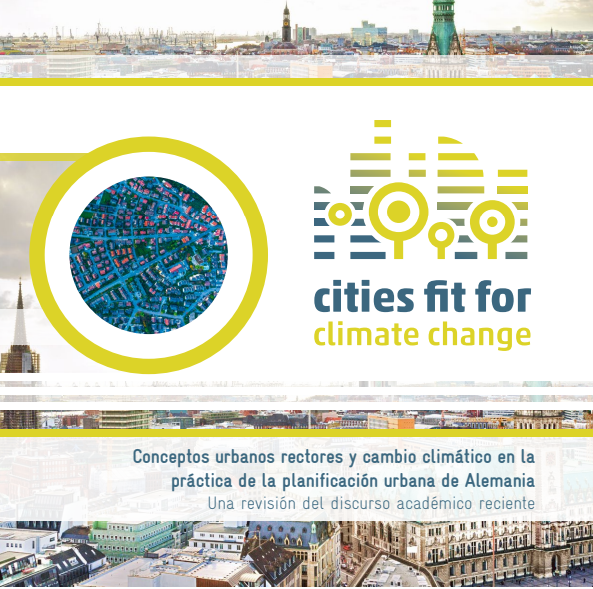The regional working group ‘Cities and Climate Change’ of the sectoral networks GADeR-ALC and red-lac of GIZ, supported the translation into Spanish of the study “Guiding Urban concepts and climate change in Germany’s Urban Planning Practice“, and included an introductory section that offers a reflection on the Latin American cities and the urban development challenges they face in a climate change scenario.
In April 2018 the study “Guiding urban concepts and climate change in the urban planning practice in Germany” was published, developed under the global project of the Deutsche Gesellschaft für Internationale Zusammenarbeit (GIZ) GmbH, ‘Cities Fit for Climate Change‘ which is part of the International Climate Initiative (IKI) of the Federal Ministry for the Environment, Nature Conservation and Nuclear Safety (BMU).
As part of the activities of 2018 of the regional working group “Urban Development and Climate Change”, the opportunity to share the findings of this study in Spanish language, and to offer a reflection within the Latin American context was identified. This group arises from cooperation between the sectoral networks of Environmental Management and Rural Development in Latin America and the Caribbean (GADeR-ALC) and the State and Democracy Sector Network in Latin America and the Caribbean (red-lac) with financing from GIZ’s regional innovation fund.
The section called “Vision from the context of Latin America” is an introductory section that exposes and discusses the challenge that represents the existence of a wide inequality of urban development between cities and countries of the Latin American and Caribbean region and how these challenges are exacerbated by the pressures of climate change. Specifically, it covers the progress, challenges and current state of urban and climate policies in Bolivia, Ecuador, Mexico and Peru.
The section refers to the wide difference between contexts in the same country, and in the Latin American region. In the case of Ecuador, the Nationally Determined Contributions (NDC) is currently being built. While Mexico, already has its NDC and climate action programs at the state and municipal level, however, these are not yet fully aligned with the national climate change policy, or linked to a monitoring, reporting and verification (MRV) system. However, Peru does not have defined its adaptation and mitigation measures for cities yet; like Bolivia, where there are no adaptation strategies.
Due to geographical contrast, social inequality, and weather conditions must be designed and climate change actions that fit the particular needs and opportunity areas of each city must be established. Additionally, some of the region’s challenges are mentioned, such as the lack of institutional capacity and the knowledge transfer between medium and small cities, as well as financial support from the regions or the federal level.
For its part, the original study explains urban guiding concepts, their evolution and application in Germany. It also explains that the urban guiding concepts are principles that are part of the urban development strategic planning. Some of the concepts mentioned are: compact city, less rigid urban landscape, axial city, decentralized model, among others.
The study in its first chapter exposes the climate change challenges that Germany has faced and how it has responded to them from the cities. In its second part, it explains the transition from territorial form and organization to urban concepts. The third chapter focuses on research that has been developed with respect to urban guiding concepts specifically in Germany and Europe. The fourth section takes up some of the concepts and addresses an in-depth analysis of them. Finally, the fifth chapter presents a summary of the study and discusses the adjustment of existing concepts in a context of climate change and presents a possible evolution of them.
Through the translation of this study and the inclusion of the Latin American vision, the aim is to scale up and replicate the implementation of urban guiding concepts to other regions with different contexts, including a perspective that addresses the effects of climate change.
The study is available (in spanish) here.

